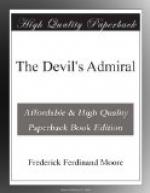The sharp edge must have cut him, for he uttered a stifled groan, and as he recoiled from me, partly from my blow and partly as the result of a deep roll of the vessel, I wriggled out of my jacket and ran forward. In my flight I bumped into ventilators, stumbled over a hatch-coaming and pulled myself along the swaying rail-chains toward the bow of the vessel. In the scuffle I had lost the crucifix, but I had also escaped from the man who had grabbed me, and, while I was in a panic and did not know where I was going, I hoped to be able to regain the ladder on the port side and get back to my room once I had thrown my assailant off my track.
I reached the break of the forecastle head, but did not go into the bows, because I knew I could not hope to escape from them if I did not keep open some means of retreat. I halted at the closed scuttle of the forecastle, for from there I could have my choice of getting aft again along either rail. I clung to the wooden hood, naked to the waist, and swept continually by the spindrift from the seas which met the vessel.
As my eyes grew more accustomed to the darkness I could distinguish the outlines of the machinery on deck, the foremast and the companionway forward of the superstructure. I could make out the bridge and the funnel well enough to see a figure moving over the rim of the storm-apron. The vessel rolled and the side-lights threw red and green glares over the sea on either side.
As I stood there waiting for some sound which might tell me the position of the mysterious man who had attacked me, eight bells was struck on the bridge, and I knew it was midnight. I expected that there would be some answer from the bows, as there should be a man on lookout there, and the faint double notes of the bell in the wheel-house should have been repeated from the ship’s bell near to where I stood.
I had about decided to make another sortie toward the ladder, when I heard a commotion on the bridge, and then a yell as a man might give who had been stricken suddenly with death. It chilled my blood, for I knew that another blow had been struck which took another life on board the Kut Sang, and I realized that the striking of the bells had been a sort of signal for the assassin.
After a minute I heard Harris bawl: “The Dutchman has been killed! Ho, cap’n—the Dutchman has been knifed on the bridge!”
“The devil and all ye say!” shouted Captain Riggs from the fore-deck, and I heard him clamber up the ladder and knew it must have been he who grabbed me as I was about to gain the upper deck.
“Who was it, Mr. Harris? What in God’s name is this, Mr. Harris? Mutiny? Is this mutiny aboard me?” He was mounting to the bridge.
“They got the Dutchman,” repeated Harris. “They done for him—he’s dead as a red mackerel!”
“It’s mutiny, Mr. Harris,” said the captain.
“Ye know cussed well what it is,” shouted Harris, as loudly as though Captain Riggs were still below. “I come up to take the watch and find the Dutchman hangin’ over the port ladder bleedin’ like a dead goose! More work of yer fine passengers, that’s what it is, and ye know why.”




